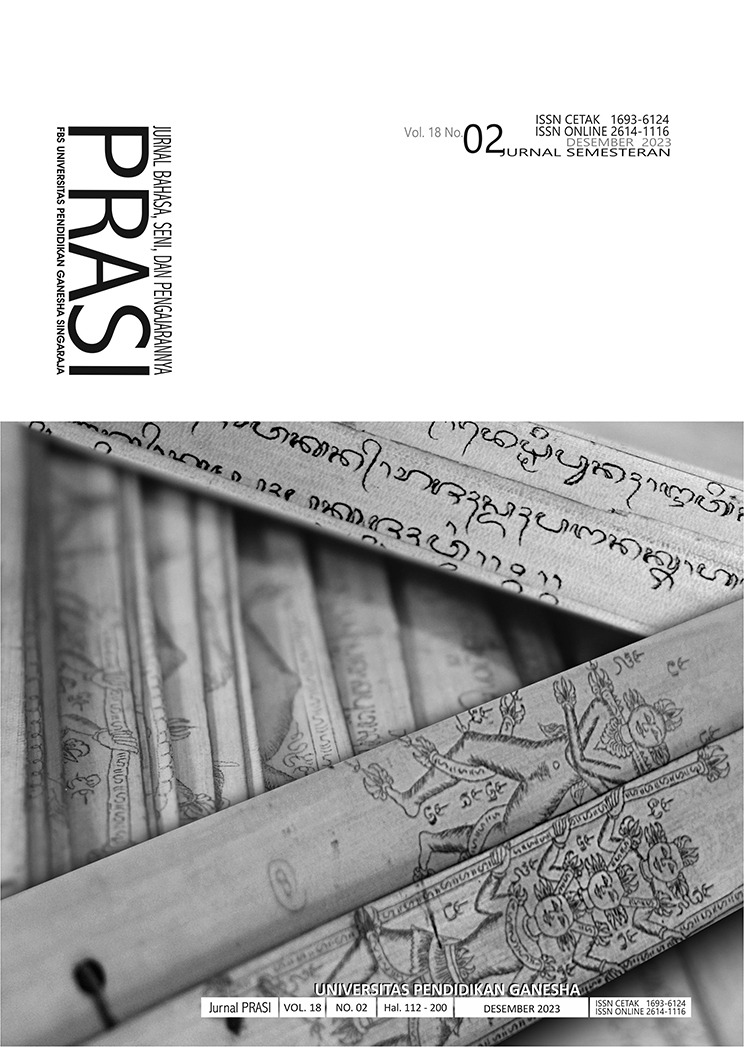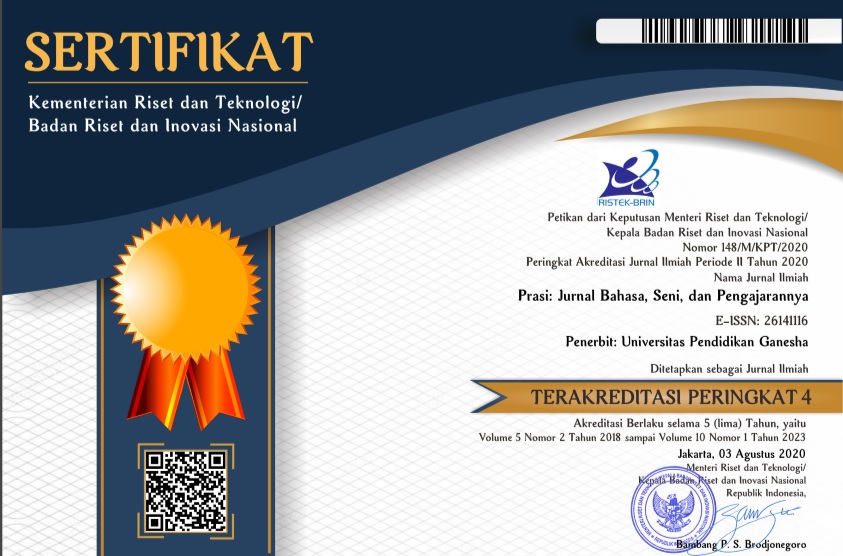THE EFFECTIVENESS OF USING DUOLINGO ON STUDENTS’ VOCABULARY MASTERY AND WRITING COMPETENCE OF THE EIGHTH GRADE STUDENTS
DOI:
https://doi.org/10.23887/prasi.v18i02.64848Keywords:
Duolingo, vocabulary mastery, writing competenceAbstract
This study aimed to determine the effect of Duolingo on students' vocabulary mastery and writing competence, as well as the simultaneous effect on both. The population of this study was 8th-grade students of SMP Negeri 1 Singaraja in the academic year 2022/2023, totaling 329 students. The sample of this study involved 67 students, consisting of 34 students in the experimental group and 33 students in the control group. Multistage sampling was used as a sampling technique. Data were collected through a post-test covering writing competency tests and vocabulary tests. The data were analyzed using one-way MANOVA through the SPSS 22.0 application. The results showed that 1) there was a simultaneous effect of using Duolingo on students' vocabulary mastery and writing competence; 2) students who were taught using Duolingo showed better vocabulary mastery than those who were taught using conventional media; and 3) students who were taught using Duolingo showed better writing competence than those who were taught using conventional media. Thus, this study indicates that Duolingo enables students to acquire new vocabulary and master it so that their writing competence increases and motivates students to learn English in a fun way.
References
Ajisoko, P. (2020). The use of Duolingo Apps to Improve English Vocabulary Learning. International Journal of Emerging Technologies in Learning (iJET), 15(7), 149-155.
Alfuhaid, S. R. (2021). The Utilisation of Duolingo to Enhance The Speaking Proficiency of EFL Secondary School Students in Saudi Arabia. English Language Teaching, 14(11), 9-15.
Ali, N. (2021). The Effect of Duolingo Usage on Students’ Vocabulary Mastery of Seventh-Grade Students at MTs PAB 1 Helvetia. Jurnal Serunai Bahasa Inggris, 13(1), 23-30. https://doi.org/10.37755/jsbi.v13i1.347
Alsubaie, A., & Madini, A. A. (2018). The effect of Using Blogs to Enhance The Writing Skill of English Language Learners at A Saudi University. Global Journal of Educational Studies, 4(1), 13-30.
Anisa, K. D., Marmanto, S., & Supriyadi, S. (2020). The Effect of Gamification on Students’ Motivation in Learning English. Leksika: Jurnal Bahasa, Sastra dan Pengajarannya, 14(1), 22-28.
Aryuntini, N., Astuti, I., & Yuliana, Y. (2018). Development of Learning Media Based on Videoscribe to Improve Writing Skill for Descriptive Text of English Language Study. Journal of Education, Teaching and Learning, 3(2), 187-194.
Aulia, H. R., Wahjuningsih, E., & Andayani, R. (2020). The Effect of Duolingo Application on Students’ English Vocabulary Mastery. ELTR Journal, 4(2), 131-139. https://doi.org/10.37147/eltr.v4i2.71
Azar, A. S., & Tan, N. H. I. (2020). The Application of ICT Techs (Mobile-Assisted Language Learning, Gamification, and Virtual Reality) in Teaching English for Secondary School Students in Malaysia During Covid-19 Pandemic. Universal Journal of Educational Research, 8(11C), 55-63.
Bai, Z. (2018). An Analysis of English Vocabulary Learning Strategies. Journal of language Teaching and Research, 9(4), 849-855. DOI: http://dx.doi.org/10.17507/jltr.0904.24
Budiani, I. (2020). The Effect of Duolingo on the Writing Competency of the Tenth Grade Students of SMK N 1 Sukasada in Academic Year 2017/2018. Jurnal Pendidikan Bahasa Inggris Indonesia, 8(1), 21-30. https://doi.org/10.23887/jpbi.v8i1.3155
Fathan, U. S. A., & Syafii, A. (2018). Kahoot as The Media Platform for Learn English. English Education: Journal of English Teaching and Research, 3(1), 52-57.
Fraenkel, J. R., Wallen, N. E., & Hyun, H. H. (2012). How to Design and Evaluate Research in Education (Vol. 7, p. 429). New York: McGraw-hill.
Hadijah, S., Marhamah, M., & Shalawati, S. (2020). Interactive and Educative Learning Media in English Language Teaching at Senior High Schools. AL-ISHLAH: Jurnal Pendidikan, 12(2), 304-315. https://doi.org/10.35445/alishlah.v12i2.202
Hidayati, K. H. (2018). Teaching writing to EFL learners: An Investigation of Challenges Confronted by Indonesian Teachers. Langkawi: Journal of The Association for Arabic and English, 4(1), 21-31. http://dx.doi.org/10.31332/lkw.v4i1.772
Hidayati, T., & Diana, S. (2019). Students’ Motivation to Learn English Using Mobile Applications: The Case Of Duolingo and Hello English. JEELS (Journal of English Education and Linguistics Studies), 6(2), 189-213. https://doi.org/10.30762/jeels.v6i2.1233
Irawan, A., Wilson, A., & Sutrisno, S. (2020). The Implementation of Duolingo Mobile Application in English Vocabulary Learning. Scope: Journal of English Language Teaching, 5(1), 08-14. http://dx.doi.org/10.30998/scope.v5i1.6568
Kapp, K. M. (2012). The Gamification of Learning and Instruction: Game-Based Methods and Strategies for Training and Education. San Francisco, CA: John Wiley & Sons.
Kusumadewi, H. (2018). The Effects of Using Duolingo Towards Student’s Vocabulary Mastery (An Experiment of Junior High School Students at Omega Sains Institute). IJET (Indonesian Journal of English Teaching), 7(2), 172-186.
Lestari, S. (2017). Implementing Padlet Application to Improve Writing Ability in English Writing Skill for Non-English Department Students. LET: Linguistics, Literature and English Teaching Journal, 7(1), 1-16. https://dx.doi.org/10.18592/let.v7i1.1640
Miller, J. J., Grise-Owens, E., Drury, W., & Rickman, C. (2018). Teaching Note—Developing A Professional Writing Course Using A Holistic View of Competence. Journal of Social Work Education, 54(4), 709-714. https://doi.org/10.1080/10437797.2018.1474152
Nalliveettil, G. M., & Mahasneh, A. (2017). Developing Competence in Basic Writing Skills: Perceptions of EFL Undergraduates. International Journal of Applied Linguistics and English Literature, 6(7), 323-341. https://doi.org/10.7575/aiac.ijalel.v.6n.7p.332
Nushi, M., & Eqbali, M. H. (2017). Duolingo: A Mobile Application to Assist Second Language Learning. Teaching English with Technology, 17(1), 89-98.
Pahamzah, J., Syafrizal, S., Masrupi, M., & Yohaningsih, N. (2021). The Impact of Schoology on Students’ Reading Comprehension and Writing Skill for Senior High School. International Journal of English Language and Linguistics Research, 9(5), 1-9. https://ssrn.com/abstract=3866430
Psychogyiou, A., & Karasimos, A. (2019). The effectiveness of Learning A Foreign Language Via A Distance Learning Tool: Τesting The Duolingo Application. Selected papers on theoretical and applied linguistics, 23, 364-380. https://doi.org/10.26262/istal.v23i0.7354
Purwanto, H. N., Faridi, A., & Rozi, F. (2022). The Effect of DuoLingo and SPADA to Teach Listening to Students with Different Achievement Levels. English Education Journal, 12(1), 86-94. https://doi.org/10.15294/eej.v12i1.54417
Puspitasari, E. D. T., Surjono, H. D., & Minghat, A. D. (2018). Utilizing Web-Based Learning as 21st Century Learning Media for Vocational Education. International Journal of Engineering and Technology (UAE), 7(4), 157-160.
Putri, N. S. (2019). Kahoot Application in English Language Teaching (ELT) Context: An Alternative Learning Strategy. ELSYA: Journal of English Language Studies, 1(1), 11-15. https://doi.org/10.31849/elsya.v1i1.2488
Putri, R. O. (2018). Investigating The Link Between Critical Thinking Skill and Argumentative Writing Skill: The Case Of Islamic Senior High School. Edukasi: Jurnal Pendidikan Dan Pengajaran, 5(2), 144-153. https://doi.org/10.19109/ejpp.v5i2.2090
Qomar, A. H. (2017). The Correlation between Students’ Reading Motivation, Vocabulary Mastery and Writing Ability in Recount Text. Premise: Journal of English Education and Applied Linguistics, 5(2), 21-32.
Ratminingsih, N. M., & Budasi, I. G. (2018). Local Culture-Based Picture Storybooks for Teaching English for Young Learners. In SHS Web of Conferences (Vol. 42, p. 00016). EDP Sciences. https://doi.org/10.1051/shsconf/20184200016
Ratminingsih, N. M., Marhaeni, A. A. I. N., & Vigayanti, L. P. D. (2018). Self-Assessment: The Effect on Students' Independence and Writing Competence. International Journal of Instruction, 11(3), 277-290.
Redjeki, I. S., & Muhajir, R. (2021). Gamification in EFL Classroom to Support Teaching and Learning in 21st Century. JEES (Journal of English Educators Society), 6(1), 68-78. https://doi.org/10.21070/jees.v6i1.882
Sakkir, G. (2020). The Effectiveness of Pictures in Enhance Writing Skill of Senior High School Students. Interference: Journal of Language, Literature, and Linguistics, 1(1).
Sánchez, C. (2019). Multimodal Writing in A Second Language: CHAT and Duolingo. GWR Journal, 9(2), 127-139.
Santoso, I., & Andriyadi, A. (2019). The Use of My Dictionary Application to Improve Students’ Vocabulary Mastery. ElTIN Journal: Journal of English Language Teaching in Indonesia, 7(1), 35-42. https://doi.org/10.22460/eltin.v7i1.p35-42
Shegay, A., Orazova, F., & Krivosheeva, G. (2020). Possible Writing Techniques While Teaching for Students Whose English is A Foreign Language. European Journal of Research and Reflection in Educational Sciences, 8(6).
Shortt, M., Tilak, S., Kuznetcova, I., Martens, B., & Akinkuolie, B. (2021). Gamification in Mobile-Assisted Language Learning: A Systematic Review of Duolingo Literature from Public Release of 2012 to Early 2020. Computer Assisted Language Learning, 1-38. https://doi.org/10.1080/09588221.2021.1933540
Sulaiman, S. (2017). Improving Students’ Achievement in Writing Narrative Text Through Modelling Technique in the Second Semester of The Eight-Year Students of Public Junior High School 2 Blitar. International Research-Based Education Journal, 1(1).
Sulistyaningrum, R. A., & Siswantoro, S. (2019). A Correlational Study Between Students’ Vocabulary Mastery, Reading Habit and Writing Skill. English Education, 7(1), 113-122. https://doi.org/10.20961/eed.v7i1.35841
Susanto, A. (2017). The Teaching of Vocabulary: A Perspective. Jurnal Kata: Penelitian Tentang Ilmu Bahasa Dan Sastra, 1(2), 182-191. https://doi.org/10.22216/jk.v1i2.2136
Syahputra, M. (2019). Duolingo Gamification: Does it Reduce Students’ Grammatical Errors in Writing? Getsempena English Education Journal, 6(1), 1-12.
Utami, D. Y. (2020). Students’ Perception on The Use of Duolingo as a Language Learning Application for Learning English (Doctoral dissertation, UIN Ar-Raniry Banda Aceh).
Waluyo, B., & Bucol, J. L. (2021). The Impact of Gamified Vocabulary Learning Using Quizlet on Low-Proficiency Students. Computer Assisted Language Learning Electronic Journal, 22(1), 164-185.
Downloads
Published
Issue
Section
License
Copyright (c) 2023 Wayan Radita Yuda Pradana, Ni Made Ratminingsih, Dewa Putu Ramendra

This work is licensed under a Creative Commons Attribution-ShareAlike 4.0 International License.
Authors who publish with Prasi agree to the following terms:- Authors retain copyright and grant the journal the right of first publication with the work simultaneously licensed under a Creative Commons Attribution License (CC BY-SA 4.0) that allows others to share the work with an acknowledgment of the work's authorship and initial publication in this journal
- Authors are able to enter into separate, additional contractual arrangements for the non-exclusive distribution of the journal's published version of the work (e.g., post it to an institutional repository or publish it in a book), with an acknowledgment of its initial publication in this journal.
- Authors are permitted and encouraged to post their work online (e.g., in institutional repositories or on their website) prior to and during the submission process, as it can lead to productive exchanges, as well as earlier and greater citation of published work. (See The Effect of Open Access)


.png)
.png)









